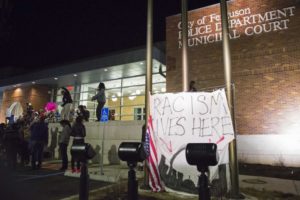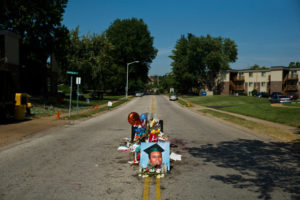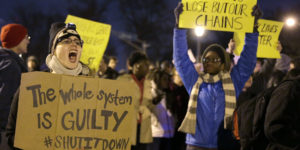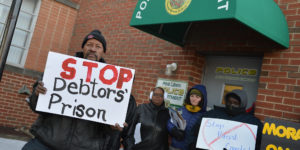When unarmed teen Michael Brown was fatally shot and killed by Ferguson police officer Darren Wilson, it marked a critical moment for the Black Lives Matter movement.
In the midst of chaos and unrest, there was at least a glimmer of hope that now, with the nation watching the small city of Ferguson closely, that change was peeking around the corner.
Protesters insisted that the teen’s death would not be in vain and cities all across the nation felt encouraged to start creating the kinds of changes that would prevent them from becoming the next Ferguson or one of their own Black citizens from becoming the next Michael Brown or Eric Garner or Tamir Rice or Walter Scott.
But in the city largely considered to be the Black Lives Matter movement’s ground zero, the landscape has failed to welcome sweeping changes or pass meaningful legislation to prevent another national tragedy.
The death of the unarmed teen was underscored by a corrupt, racially discriminatory system at the heart of Ferguson and other surrounding cities in St. Louis County.
A scathing report by the Justice Department’s Civil Rights Division found that Ferguson’s municipal court system frequently targeted Black residents and was used as a form of collecting revenue.
The report also found that the courts were accusing “certain segments” of the community of lacking “personal responsibility” after they couldn’t afford to post bail or pay off certain hefty fines.
But as the city continues defending itself against a civil rights lawsuit brought on behalf of citizens who were jailed for up to several weeks because they couldn’t afford bail after being arrested for minor municipal code violations, little seems to have changed in a way that would be meaningful for their defense.
Even after a massive overhaul of the court system and the resignation of several top officials in the city, Ferguson and its neighboring cities still seems to be guilty of their usual antics.
“Any injury or damage sustained by Plaintiffs was sustained as the direct and proximate result of Plaintiffs’ own criminal conduct, negligence, carelessness and comparative fault and thus thereby, Plaintiffs are not entitled to recover from Defendants, or any recovery of Plaintiffs should be reduced by the percentage of Plaintiffs’ own negligence, carelessness and comparative fault contributing thereto,” Peter Dunne, an attorney with the law firm defending Ferguson, argued in a court filing earlier this week, according to the Huffington Post.
But, as the DOJ pointed out following its probe of the city, the “lack of personal responsibility” that the courts are so adamantly accusing their citizens of, was excused when it came to friends and family of city officials.
Several officials were forced to step down from their positions after it was revealed that they regularly wrote off tickets and fines for people they knew.
“So even as the city sets about changing its municipal court system, the city is in the awkward position of having an attorney write sentences like these,” the Huffington Post reports. “‘Defendant denies jail staff refused to give woman more than one blanket.’ ‘Defendant is without information or knowledge sufficient to form a belief as to whether Plaintiff was fired from several jobs because of her absences, or whether she depended on food stamps to supplement her income to feed her children.’ ‘Defendant admits the City of Ferguson provided breakfast, lunch, and dinner, which was typically a honey bun for breakfast, a pot pie for lunch, and a pot pie for dinner.’ ‘Defendant is without knowledge or information sufficient to form a belief as to whether Ms. Fant missed her father’s funeral.’”

“We [ought] to have been prioritizing this a long time ago,” Richardson said shortly after a bill passed that would limit the amount of traffic revenue cities could keep. “It’s not right to have a system in our state where we’ve got municipalities that are basically funding the basic operations of government through traffic fines.”
But other than an underwhelming bill placing a ceiling a traffic revenue, few legislative changes have happened in Ferguson just two months shy of the one year anniversary of Brown’s death.
“I think the plan was systematically not to put any bill—that would have actually have helped Ferguson or any Ferguson-like situations—put them forward,” said State Rep. Clem Smith.
All across Missouri, Ferguson-like legislation seemed scarce.
Proposals to expand the use of police body cameras, reform training for officers that would better educate them and prepare them for racial biases in the field or even change current regulation about when officers are allowed to use deadly force, have all fallen short of their legislative goals.
It’s an unfortunate sign that Ferguson’s revolving door of new officials still hasn’t been effective in bringing about meaningful change.

As his street side memorial will soon be completely removed, a small plaque in its place could very well be the only lasting change the city sees as a result of his death.
What makes this even more disconcerting is the fact that without impactful changes and a clear attempt from legislators to help Ferguson recover, not only from the post-Brown chaos but also years of discrimination and corruption, the city is still at risk of seeing history repeat itself in a small community that genuinely can’t afford such a tragedy.




